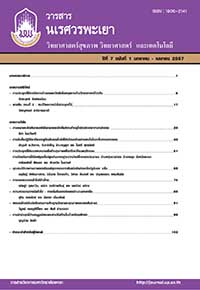การประยุกต์ใช้เทคนิคการจำลองพลวัตเชิงโมเลกุลทางด้านวิทยาศาสตร์โปรตีน
Keywords:
การจำลองพลวัตเชิงโมเลกุล, การออกแบบและการจำลองชีวโมเลกุล, วิทยาศาสตร์โปรตีน, สมบัติพลวัตของโปรตีน, Molecular dynamics simulation, biomolecular modeling and simulation, protein science, protein dynamicsAbstract
ตลอดหลายทศวรรษที่ผ่านมา เทคนิคการจำลองพลวัตเชิงโมเลกุล เป็นเทคนิคที่มีความสำคัญอย่างมากต่องานวิจัยทางด้านวิทยาศาสตร์โปรตีน เทคนิคนี้นิยมใช้ในการศึกษาสมบัติทางโครงสร้าง สมบัติพลวัต และสมบัติทางเทอร์โมไดนามิกส์ของโปรตีน เพื่ออธิบายและทำนายกระบวนการสำคัญทางชีวเคมีในธรรมชาติ เช่น การม้วนพับตัวของโปรตีน การเร่งปฏิกิริยาเคมีของเอนไซม์ เสถียรภาพของโปรตีนในสารละลาย การเปลี่ยนแปลงโครงสร้างที่สัมพันธ์กับหน้าที่ของโปรตีน และการจดจำโมเลกุลของโปรตีน เช่น โปรตีน-เปปไทด์ โปรตีน-ยา และโปรตีน-ตัวยับยั้ง เป็นต้น บทความนี้ได้นำเสนอตัวอย่างผลงานวิจัยที่เกี่ยวข้องกับสมบัติดังกล่าวของโปรตีน เพื่อสะท้อนให้เห็นถึงบทบาท และการประยุกต์ใช้เทคนิคการจำลองพลวัตเชิงโมเลกุลในงานวิจัยทางด้านวิทยาศาสตร์โปรตีนในปัจจุบัน
Applications of molecular dynamics simulation techniques in protein science
Jitrayut Jitonnom1
1 Division of Chemistry, School of Science, University of Phayao, Phayao Province 56000
Molecular dynamics (MD) simulation techniques have increasingly been applied as an essential tool in the field of protein science over the past decades. They are now routinely used to investigate the structure, dynamics, and thermodynamics of proteins to understand and predict important biochemical processes such as protein folding, enzyme catalysis, protein stability in solution, conformational changes associated with protein function, and molecular recognition of proteins such as protein-peptide, protein-drug, protein-inhibitor, etc. This review has highlighted some recent applications of MD simulations in studying such protein activities, providing the significance and applications of MD techniques currently used in protein science.
Downloads
Published
How to Cite
Issue
Section
License
ผู้นิพนธ์ต้องรับผิดชอบข้อความในบทนิพนธ์ของตน มหาวิทยาลัยพะเยาไม่จำเป็นต้องเห็นด้วยกับบทความที่ตีพิมพ์เสมอไป ผู้สนใจสามารถคัดลอก และนำไปใช้ได้ แต่จะต้องขออนุมัติเจ้าของ และได้รับการอนุมัติเป็นลายลักษณ์อักษรก่อน พร้อมกับมีการอ้างอิงและกล่าวคำขอบคุณให้ถูกต้องด้วย
The authors are themselves responsible for their contents. Signed articles may not always reflect the opinion of University of Phayao. The articles can be reproduced and reprinted, provided that permission is given by the authors and acknowledgement must be given.








